Leather care mistakes can result in irreversible damage to your valuable footwear. One of the most common errors is applying waterproofing spray to smooth leather. Although these sprays may seem like a quick fix for protecting your shoes, they can disrupt the essential nutrients that are crucial for the leather, leading to dryness and cracking over time. Smooth leather is inherently designed with natural water-resistant properties within its grain, requiring regular nourishment through shoe creams and waxes to maintain its durability. Instead of relying on sprays, choose high-quality leather conditioners and wax polishes that not only protect the leather but also nourish it, ensuring its longevity while keeping its natural characteristics intact.
Mastering Leather Protection: Essential Knowledge for Lasting Quality
To prolong the lifespan of your leather products, it’s vital to understand their protective characteristics. Full grain leather inherently boasts natural water-resistant qualities due to its tightly woven fiber structure. However, these properties necessitate diligent maintenance to remain effective. The resilience of your leather significantly hinges on the care it receives. Using waterproofing sprays can compromise the leather’s breathability, potentially leading to severe damage if not managed correctly. Regular cleaning and conditioning are essential to ensure that your leather remains supple and retains its natural beauty.
Discovering the Unique Benefits of Full Grain Leather in Footwear
After the tanning process, full grain leather retains its original surface layer, which provides exceptional natural protection against environmental factors. Items made from this material feature an intact grain layer that resists water and wear effectively. This upper layer is rich in natural oils and fibers, forming a protective barrier that makes additional waterproofing sprays unnecessary and potentially harmful to the leather’s overall health. By understanding these benefits, you can better appreciate and care for your leather belongings.
Comprehending Leather’s Moisture Management and Aging Dynamics
Grain leather must effectively manage its ability to absorb and release moisture. The pores in your leather allow it to breathe and regulate moisture, keeping it flexible and preventing unattractive cracking. However, the application of waterproofing sprays can seal these pores, restricting essential airflow and disrupting the natural moisture balance. As leather ages, it requires proper nourishment through conditioning products. When waterproofing sprays are used, they create a barrier that blocks vital conditioning oils from penetrating the leather, which can lead to the material becoming dry and brittle over time. Regular application of leather cream helps your leather to age beautifully and develop a rich, desirable patina.
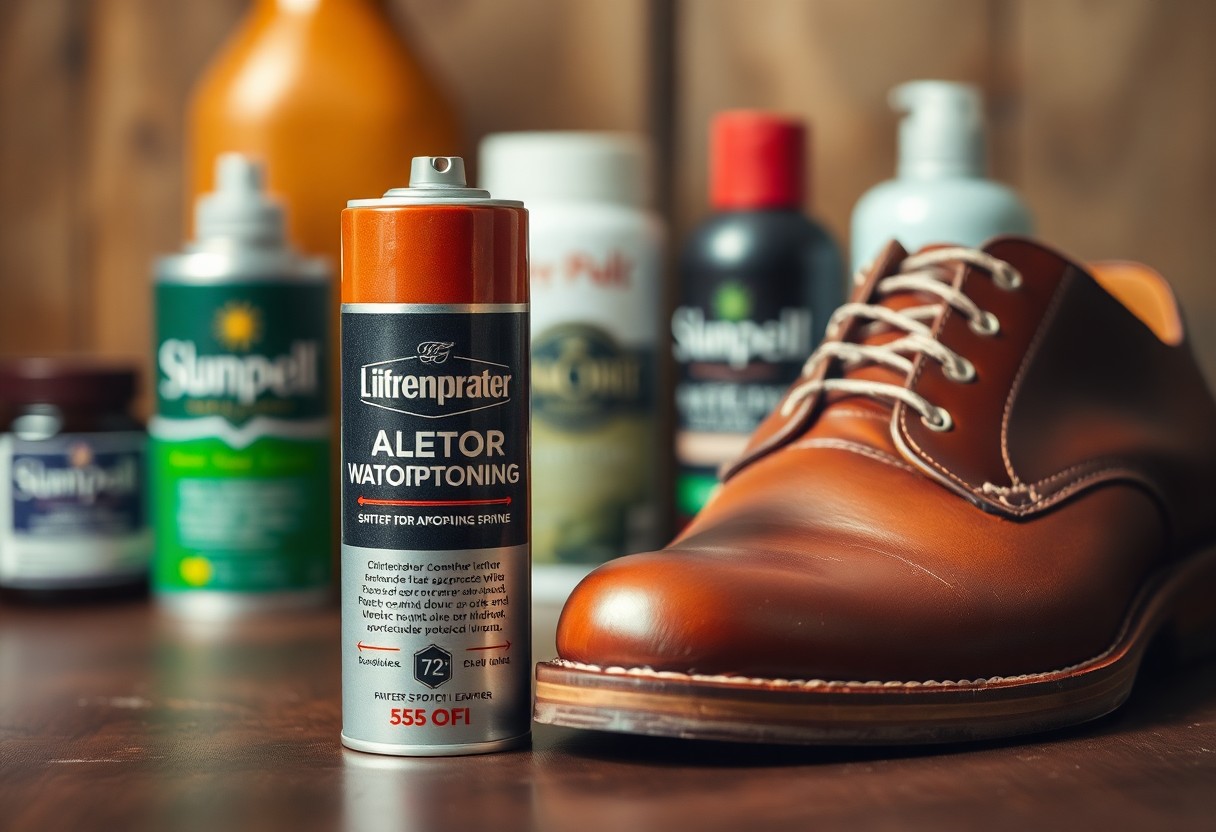
Recognizing the Dangers of Waterproofing Spray Misuse
Many people mistakenly believe that waterproofing spray is the ultimate safeguard for their leather shoes. However, this common practice can result in substantial harm to your footwear. While these sprays provide an immediate protective barrier against water, they simultaneously block essential nutrients from reaching the leather, paving the way for potential long-term deterioration. Understanding this risk is crucial for maintaining the health of your leather shoes.
Dispelling Common Misconceptions about Leather Care Products
Thanks to aggressive marketing campaigns and well-intentioned advice from shoe store personnel, you may have been led to believe that waterproofing spray is mandatory for all leather shoes. This myth has been perpetuated by many shoe retailers, largely because of the high profit margins and frequent repeat purchases associated with these products. The truth is that regular smooth leather possesses inherent protective qualities that do not necessitate additional spray-on solutions for effective safeguarding. Educating yourself on proper leather care will empower you to make informed choices.
Weighing Immediate Gains Against Long-Term Damage Risks
Damage to your leather footwear begins when waterproofing sprays create a barrier that prevents essential oils and conditioning agents from penetrating the leather. Although you may initially appreciate improved water resistance, the reality is that your leather gradually becomes dry and brittle without the critical nourishment it requires. The consequences of using waterproofing sprays on smooth leather extend beyond superficial protection. Your leather needs consistent nourishment to maintain its flexibility and longevity. When shoe creams and conditioners cannot reach the leather due to the spray barrier, the material risks cracking and deterioration, significantly shortening the lifespan of your shoes. Opting for natural waxes and appropriate conditioning methods provides superior long-term protection while promoting the health of the leather.
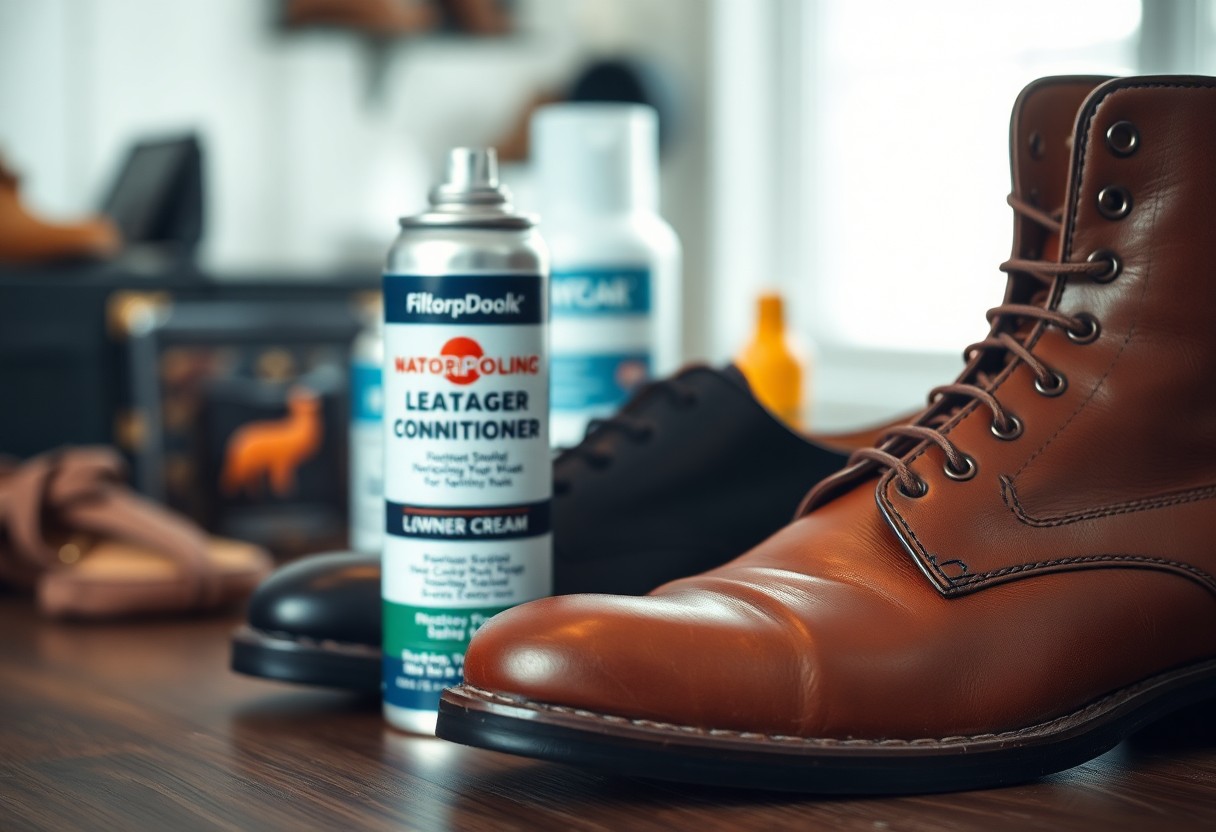
Exploring the Underlying Science Behind Leather Care
An essential aspect of effective leather care is understanding its molecular makeup. The collagen fiber networks within your leather shoes require both protection and nourishment. The products applied to leather can interact with these fibers by either coating or penetrating them. This interaction is vital for ensuring the long-term health of your leather footwear, as it impacts how well the leather can withstand wear and maintain its aesthetic appeal.
Understanding the Critical Role of Nourishing Leather
It’s crucial to recognize that your leather shoes need regular nourishment to maintain their quality. The natural oils found within your leather shoes help prevent cracking and sustain flexibility. Over time, these oils diminish due to routine wear and exposure to environmental factors. To preserve the structural integrity of the leather, it is essential to replenish these oils through consistent conditioning, which keeps the leather moisturized and extends its usable life.
Evaluating the Barrier Effects of Waterproofing Sprays
A significant problem with waterproofing sprays is their tendency to create a barrier. When these sprays are applied to smooth leather, they form an impermeable layer that blocks both water and essential nutrients. This barrier prevents your leather care products from effectively penetrating the material, resulting in a gradual decline in quality over time. Understanding how these products work will help you make better decisions for your leather care routine.
The barrier effect of waterproofing sprays creates a problematic cycle for your footwear. While these sprays successfully repel water, they simultaneously hinder the absorption of conditioning products that are essential for maintaining the leather’s health. Consequently, while your leather may appear protected from the outside, it is dehydrating and becoming brittle beneath the surface. Silicone-based sprays are especially harmful, creating a permanent barrier that is difficult to remove without damaging the leather.
Implementing Targeted and Effective Leather Protection Strategies
Contrary to popular belief, your smooth leather shoes require specialized care methods that align with the natural properties of full-grain leather. The optimal approach integrates traditional techniques with products specifically designed to enhance the leather’s innate protective qualities, ensuring both immediate defense and lasting durability for your footwear. Understanding these methods will help you maintain the beauty and functionality of your shoes.
Harnessing the Power of Wax-Based Solutions for Enhanced Protection
A highly effective alternative to waterproofing sprays lies in premium wax-based products. These solutions work in harmony with your leather’s natural grain rather than against it. Applying wax polish creates a protective barrier that still allows the leather to breathe, making it particularly beneficial for areas subject to high wear, such as toe caps. By choosing the right products, you can safeguard your footwear without compromising its quality.
Maximizing the Advantages of Cream and Conditioner Applications
In contrast to conventional spray treatments, leather creams and conditioners provide essential nourishment while upholding the leather’s natural protective properties. Your shoes benefit from oils that penetrate deeply into the material, preventing drying and cracking. Moreover, regular applications of cream and conditioner create a cumulative effect that enhances leather quality over time. The natural oils within these products support the leather’s flexibility and strength, allowing it to develop a beautiful patina. It is advisable to apply these products every 4-6 wears to maintain optimal leather condition and appearance.
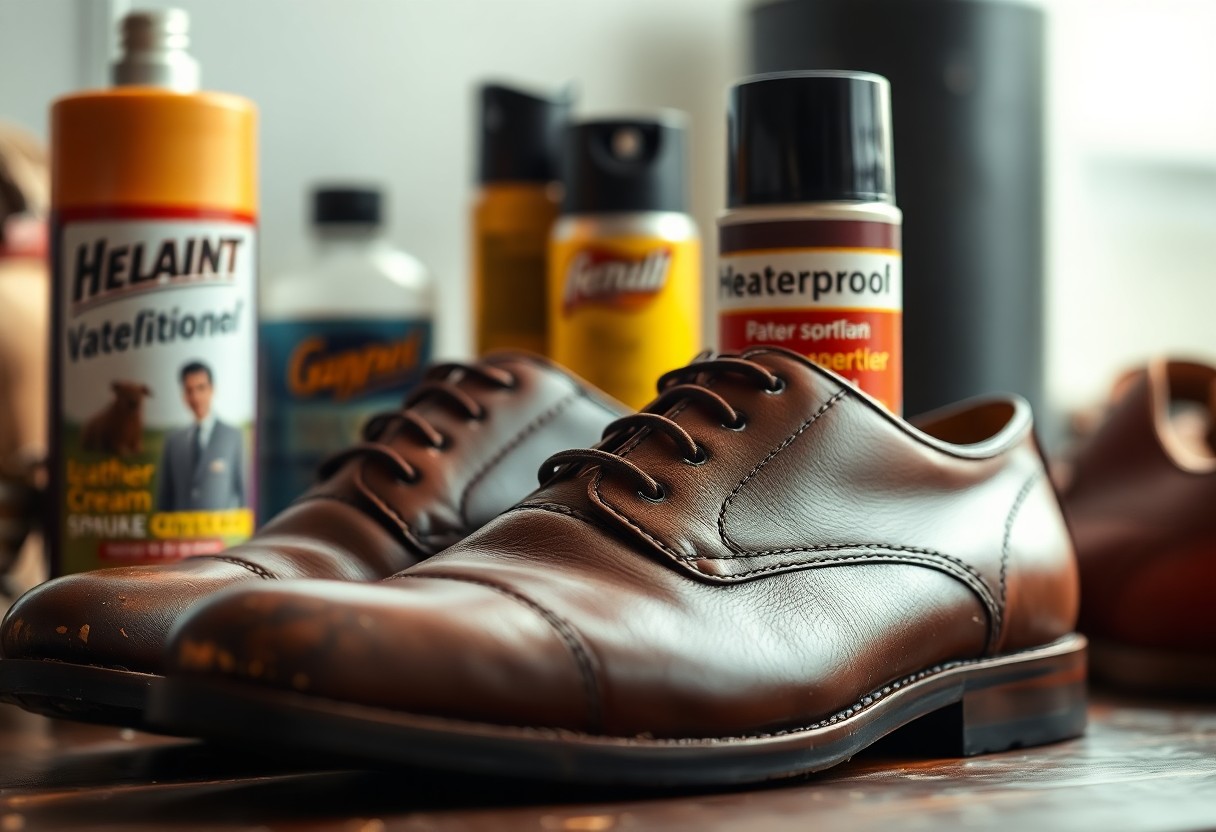
Identifying When Waterproofing Spray is Appropriate for Use
Unlike smooth leather, certain materials greatly benefit from waterproofing sprays. These products create an efficient water-resistant barrier on specific materials that lack inherent protection. Waterproofing sprays are particularly useful for suede, nubuck, and various textiles, where the material structure does not offer natural resistance to moisture. Knowing when to use these sprays can enhance the longevity of your footwear.
Enhancing Suede and Nubuck with Careful Waterproofing Spray Application
When you treat your suede or nubuck shoes with waterproofing spray, you significantly enhance their resistance to moisture damage. While many modern suede materials come pre-treated with factory waterproofing, additional protection can help maintain this defense over time. The application of spray establishes a protective barrier that effectively prevents water from penetrating these delicate materials, extending their usability and appearance.
Ensuring Robust Protection for Textile Footwear
In addition to leather alternatives, textile footwear requires specialized protection against water damage. Materials such as canvas, mesh, and synthetic fabrics can achieve enhanced water resistance through proper spray application. Given that most textile materials are naturally absorbent, they are particularly vulnerable to water damage and staining. Understanding how to protect these materials is key to maintaining their integrity.
Furthermore, waterproofing sprays for textiles help preserve the shape and color of your shoes. The barrier they create also prevents dirt and debris from becoming embedded in the fabric fibers. It’s advisable to reapply the spray every 3-4 months for optimal protection, depending on usage and prevailing weather conditions, ensuring your shoes remain in excellent condition.
Insights from Leather Care Professionals on Best Practices
Not all leather treatments are created equal. Experts in leather care strongly discourage the use of waterproofing sprays on smooth leather. Your full-grain leather shoes require specialized care that allows them to breathe and absorb nourishing treatments. Using inappropriate products can lead to leather damage costing hundreds of dollars, which can easily be avoided with proper knowledge and care.
Expert Insights from Tannery Specialists on Leather Maintenance
To maintain the quality of leather, tannery specialists stress that full-grain leather naturally possesses water-resistant properties in its outer layer. To keep the leather’s protective qualities intact, it is crucial to apply oils and waxes regularly. Waterproofing sprays can hinder these essential treatments from reaching the leather, leading to long-term damage and deterioration.
Wisdom from Experienced Cobblers on Leather Care
For the long-term care of leather, professional cobblers advocate for the use of wax-based products instead of waterproofing sprays. Your shoes will benefit from treatments that both protect and nourish the leather. Studies indicate that 90% of premature leather damage is due to the use of incorrect care products, highlighting the importance of choosing the right treatments for your footwear.
By following proper leather care techniques, your shoes can last an impressive 15-20 years as opposed to just 2-3 years with poor maintenance. Traditional wax treatments enable leather to retain its natural attributes while offering adequate moisture protection. Your investment in quality leather footwear deserves meticulous care practices that preserve both their aesthetic appeal and durability.
Essential Takeaways for Maintaining Optimal Leather Care
In summary, your smooth leather shoes require appropriate care that excludes waterproofing sprays. Instead, opt for shoe creams and waxes that nourish the leather while providing effective water protection. Full-grain leather naturally possesses protective qualities due to its grain layer, and waterproofing sprays may obstruct essential oils from permeating the leather, leading to dryness and cracking. Reserve waterproofing sprays for suede, nubuck, or textile footwear, where they can perform effectively. By selecting the right products, you can ensure the longevity and beauty of your leather shoes.
Common Questions Answered about Leather Care Practices
Q: Why is waterproofing spray harmful to smooth leather shoes?
A: Waterproofing spray forms a barrier on leather that obstructs essential oils and conditioners from penetrating the material. While it does provide water protection, it limits the necessary nourishment of the leather, leading to drying and potential cracking over time, ultimately shortening the lifespan of the shoes.
Q: What alternatives should I consider instead of waterproofing spray for smooth leather shoes?
A: Consider using a combination of shoe cream and wax polish instead. Shoe cream delivers essential oils to nourish the leather, while wax polish forms a protective layer that helps repel water. This method works harmoniously with the natural protective properties of full-grain leather, maintaining the leather’s health while ensuring effective water resistance.
Q: Which types of footwear can I safely apply waterproofing spray to?
A: Waterproofing spray is suitable for materials such as suede, nubuck, and various textiles. These materials lack the natural protection found in smooth leather and thus benefit from the protective barrier created by waterproofing sprays. Many modern suedes and nubucks may already have factory waterproofing treatments, but additional spray applications can enhance and maintain this level of protection.
The Article Why you shouldn’t use waterproofing spray on regular smooth leather and better alternatives appeared first on My Shoes Finder
The Article Waterproofing Spray on Smooth Leather: Risks and Alternatives Was Found On https://limitsofstrategy.com
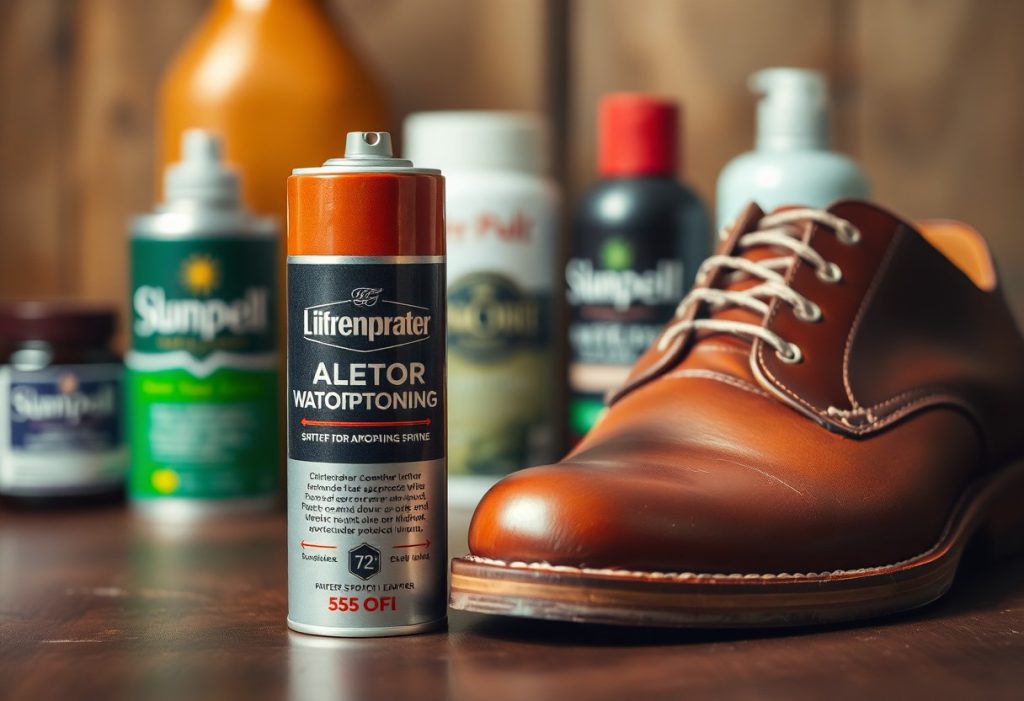

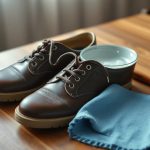
This is such an important topic! I’ve definitely learned the hard way about the downside of waterproofing sprays. A few years back, I splurged on a nice pair of smooth leather boots and thought I was being smart by spraying them to keep them protected. But soon enough, I noticed they were looking drier and more cracked than ever after just a few wears.
I completely relate to your experience with waterproofing sprays. It’s frustrating to invest in high-quality leather and then see it degrade after using a product that’s supposed to enhance its lifespan. I had a similar incident with a leather jacket; I used a spray recommended by a friend, thinking I was doing the right thing, but it ended up leaving some strange marks and made the leather feel stiff.
I totally get where you’re coming from. It’s really disappointing when a product you hoped would help ends up doing the opposite. Leather is such a beautiful and durable material, but it can be surprisingly sensitive to the wrong treatment. Your experience with the spray and those marks is a tough lesson many of us have learned.
This post highlights such an important aspect of leather maintenance that often gets overlooked. I’ve always believed that taking a proactive approach with high-quality conditioners and waxes not only benefits the leather itself but also connects us to the craftsmanship behind these products. A few years ago, I learned the hard way about the effects of waterproofing sprays on a favorite pair of leather boots. They became stiff and lost their supple texture, despite initially seeming protected.